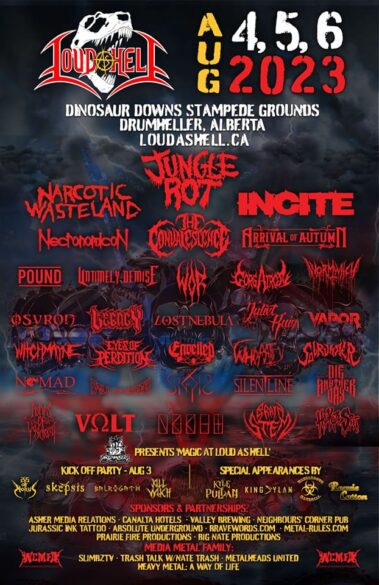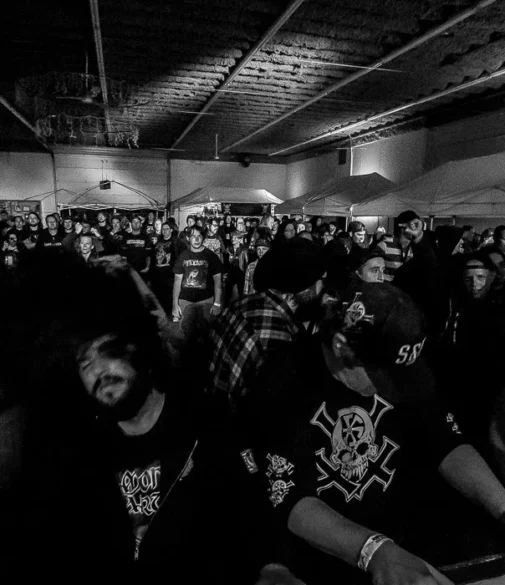

Located an hour and a half east of Calgary is the town of Drumheller, Alberta. With a population in the neighborhood of 8000 and existing smack dab in the middle of Canada’s desert and dinosaur country, it’s not a place one would immediately associate with any sort of metal scene, let alone a big-ass outdoor metal fest. But that’s where you’d be wrong. Going into its 11th year, the Loud as Hell Festival is set to roll on August 4-6th with the likes of Narcotic Wasteland, Jungle Rot and Incite headlining three days of metallic fun featuring 40 or so bands, including The Convalesence, Gorgatron, Necronomicon, Untimely Demise, Eyes of Perdition and more.
There are more fests than ever out there these days vying for your precious money and more-precious weekends. The big names are recognizable and one’s you’re long familiar with (and some of them aren’t organized and run by this magazine!). So, in the interest of throwing another option out there for you to consider and also a little bit of a look at what it takes to keep an independent metal fest located in the beautiful middle of nowhere afloat in this day and age, we caught up with founder and bossman Geoff Bourrie for a look at the past, present and future of Loud as Hell.
I didn’t realize the fest’s history went back to 2011. What was the original motivation for doing this?
2012 actually. We’re in our 11th year and it actually happened by mistake. It was never intended to be an annual event. Me and a friend of mine promote local bands and do small shows here in Drumheller and through one of the promoters I deal with from Vancouver we had the opportunity to bring Kill Devil Hill, which was the supergroup that featured Rex Brown from Pantera, Vinny Appice and so on, here back in 2012. We really wanted to do it, but their guarantee was so much that we didn’t know how to do it. We figured we’d throw an event over two days with ten bands and call it Loud as Hell. By the end of that weekend, we had so much fun and, even though we lost some money, we figured we could do it better and decided we were going to try it again. And here we are 11 years later.
Being based in Drumheller means that the majority of attendees are traveling to the fest, but is there a scene in town that you’re able to work with and around to help Loud as Hell?
Yes. For sure it’s a small scene, but being a small scene means a lot of people put in the effort to put on local shows and attend. Being that we’re one of the only groups that are bringing live bands here, it got a bit of a kick going and people were actually liking what we were doing. We use the Loud as Hell banner to promote shows throughout the year and we’re basically the best gas stop that western Canadian bands or bands that are touring western Canada can get on a tour. Bands can come out here on a Monday or Tuesday night and we can fill our little venue with metalheads who are willing to buy beer, merch and shit. So, it’s kind of turned full circle on us in a positive way where our local support helps the festival and in turn the festival is helping with better shows locally.
Does Drumheller’s size and location make it difficult to attract bigger names and/or fly in bands without the added draw of having them play Calgary or Edmonton, which would ultimately subtract from your draw?
It can be, and it especially was for the first handful of years because we are a little bit off the grid. We have to fly bands into Calgary, have someone pick them up and drive them out here. It was definitely a challenge during the first handful of years, but once we started gaining some momentum with some of the bands we were bringing, we started getting a little bit more recognition. In year five or six, we brought in Battlecross and we’ve had Fit for an Autopsy, Goatwhore and a little bit of the next echelon of talent. Now, when we talk to a lot of agents they’re very well aware of who we are, where we are and the fact that we’re one of the largest underground metal festivals in Canada. One of the big struggles we have is we always do it on the Canadian August long weekend and that’s the same days that Wacken goes in Germany. For us, it can be really hard to get bands because half the bands we want to bring are either playing there or touring overseas in the summer. Generally with headliners we try to do a one-off where we’ll fly them in so there’s no Calgary or Edmonton date. They’re basically flying in to do our show and our show only and that makes a little bit more exciting for anyone in western Canada. That’s how we’ve been able to capitalize and continually grow our festival.

*pre-open air Loud as Hell crowd scene
How has your attendance grown over the years?
Our very first year we had 141 people [laughs]. I tell that story a lot because we wanted to get to 100 and we got to 141 [laughs]. Last year we hit about 800. We’ve shown a lot of very good growth over the last couple of years since COVID happened and things have come back up. We’ve gone open air now, so that’s made it a little more attractive to a lot of people. With the onsite camping we’ve found that we’re starting to hit a bit of a niche in doing things similar to the way the European festival experience. We have vendors, food trucks, you don’t have to leave the site all weekend, it’s all-ages and family friendly with the camping. We like to think it’s like a European festival, but on a much smaller scale. We like to take a page out of the European book and I think that’s helped us. We’re one of the very few camping festivals in western Canada and you can come, sleep in a tent, sleep in your van, set up an RV, whatever you want and everything you need in terms of ice, supplies, booze and everything else will be there all weekend.
How did having to shut down for a couple years impact your approach, your attitude towards and how you do Loud as Hell? Did you come out feeling more energized?
It was tough. We only shut down for one year. We had announced our line up in April 2020 and by mid-May we had to cancel. That was really tough on us as a smaller budget independent festival because we already had a bunch of money put out into the market — deposits on bands, equipment and sound — so it made it challenging to recoup and re-energize that side of things. As far as the talent side, it gave us a bit of a reset. We weren’t sure if we were going to be able to go in 2021, but I believe we were one of the only festivals that went that year. 2021 was a year we took advantage of the COVID situation. Before, we were in a venue and we had to move it outside to have enough room for people to social distance and all that. If we were to have stayed in a venue, the local health authorities said we were only allowed to have 50% capacity and we couldn’t have a festival at 50%. This gave us an opportunity to take it to the next level, but also at the same time take the extra step of going open air with an outdoor stage, outdoor sound system and all that stuff. That first year back we kept the lineup completely Canadian which saved us a lot of money and worked towards making this open air. Last year, because we book our bands during November the year before, we didn’t know if there were going to be travel restrictions, so we kept it Canadian again as well because we didn’t want to put a deposit on a band that couldn’t end up getting across the border. So, we took COVID as a positive to get out of the venue atmosphere because we were capped at what we could do. If we wanted to get to where we wanted to be, we needed to take that next step. We couldn’t control that situation, but what could we control? We could control how we build this going forward, so that’s what me and my team did and going into this year. I feel that going into this year we’re so much more prepared, it being three years after the shutdown and I think we’ve got a really good grasp of our growth and where we’re going to take this over the next three to four years.
Where do you want to get to? What are your goals for the fest’s future?
Getting to 1000 attendees will be a milestone. We’re hoping to do that this year, but honestly we want to be the premier loud music festival in Canada. I know Heavy Montreal has got a lot of momentum and money behind it, but that’s not a full-on camping festival the way we set up ours. There’s Armstrong Metalfest in BC and they do camping, so they’re along the lines of our thing, but ideally we’d like to be the stop. Drumheller will rarely, if ever, be a stop on any big package tour. For us to get a big package to stop at Loud as Hell and only play here instead of Calgary and Edmonton would be a goal as well. We’d love to see 2500 people in five years from now and have to move to a different land location because we’ve basically run out of space.
Drumheller’s location is in the desert, correct? And the town is billed as the “dinosaur capital of the world”?
It is the dinosaur capital of the world! There are dinosaurs on every fucking street corner [laughs]. There’s a big museum here and stuff and that’s a big selling point for us. We’re in the Canadian badlands and when you get to Drumheller the scenery out here is so different. The town was built in a big ditch basically, like a crater or canyon, and there’s stuff like an 80 foot T-Rex you can walk up and look over town. Everything here is themed to dinosaurs. I drew our logo myself and there’s a T-Rex skull in behind it. That’s also a selling point because it’s an all-ages festival and you can bring your family, camp, hit the museum, watch some bands, go down to the splash park…there are so many touristy things to do in this town that it’s an easy sell for people coming through even if they’re not coming for the festival.

*the mayor of Drumheller
Being in the desert, I’ve heard you have rattlesnakes?
[Laughs] We don’t get too many of them around any more, but there are a few here and there. Our whole set up is done at one of the race tracks for stock cars and stuff and they have a big venue that holds a few hundred people and a big grass area for tenters and stuff. We’re not really in the grit of things and we have a pretty nice spot so we don’t have to worry about things like that. Generally, it’s very desert-like out here; tumbleweeds, dusty, dry as fuck. Two years ago we hit 40-41 celsius on two of the days and it was insanely hot. We also have onsite EMS full time which we started doing after COVID as well.
What have been some of the more surprising challenges you’ve encountered as you’ve grown Loud as Hell?
You don’t realize the amount of actual help you need. Two of us founded this but the other guy is no longer part of it and has moved on. So, for me being the main organizer, I had a hard time learning to let things go and let things happen. That’s one of the biggest learning experiences over the course of ten years: learning to ask for help, accept help and know that it’s going to take more than a couple of hands to have this thing run as smoothly as it does. We have a crew of like 55 volunteers and a staff of about a dozen people. At the beginning, when you have a couple buddies helping you out, everything seems pretty straight forward. But as you get bigger, you start to realize that there’s a lot more to it. Even small things you wouldn’t think of or realize as you grow. For instance, we used to go through half a pallet of water during a fest. Now, we need two full pallets of water just for our volunteers and bands! Now, we have six different managers to take care of six different areas of fest logistics. The growing pains have been the biggest learning curves. It’ll seem we’re at a good point and dealing with all this growth, but the next year comes and there are a whole newer set of struggles and situations that come up that you have to cater to. Also, being the talent buyer, I’ve had to learn how to talk to agents and deal with that. When you’re green and first getting into it and trying to book bands, it’s pretty easy to get taken advantage of, so I’ve learned how to have a little bit of a thicker skin when it comes to negotiating and booking and getting things done right. It’s a whole different machine than when we first got into it when it was just a fun thing. It’s still fun, but the amount of work that goes into it all year to get to that weekend is insane.
Tickets, info and all that jazz:





